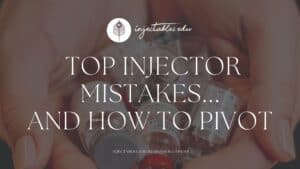Compliance in Aesthetics
Tina Richardson has been a spa owner and injector for many years in Staunton, VA. She has practiced aesthetics as a nurse injector since 2008, and she recently obtained her NP license. Tina is also a master esthetician and holds a teaching certificate for aesthetics. However, her busy practice and success have come with some significant bumps in the road. A former employee filed a complaint against her spa and was investigated by the Board of Nursing for Compliance Issues.
She is an open book about her experience and hopes to help prevent other med spa owners and licensed staff from going through the same thing she did. Tina knows first-hand how expensive and stressful it is to have to defend your practice against a nursing board investigation. And she was kind enough to share some of her knowledge on compliance issues with Injectables EDU.

What is some basic paperwork that needs to be kept as far as being legally compliant as a medspa?
I asked Tina, “What are certain documents that you may be asked to produce in the event of a Board of Nursing or Board of Medicine investigation?”
“The basic components that need to be kept to be legally compliant as a medspa can be broken down into several areas:
- Staff: There should be an employee handbook that defines and outlines expectations,work rules, and regulations. There should be documentation of HIPPA, Infection control, OSHA guidelines, and environmental hazard training. There should be ongoing documentation of training provided by the medspa, as well as training sessions offered by pharmaceutical or training facilities specific to aesthetics that employees attend.
- Policy and procedure manual: These manuals should follow the guidelines of The Board of Medicine and The Board of Nursing in respect to the reconstitution of medications, oversight, administration of neurotoxins and dermal fillers, as well as laser oversight. There should be an outline of detailed information regarding the expectation of performing each procedure, and the actual steps to follow when performing the procedure.
- Medical Director: There should be a signed contract between the Medical Director and the medspa owner/provider. The agreement should outline the expectations between both parties, and their responsibilities. If applicable, there should be a collaborative agreement for NP or PAs practicing in the medspa, outlining expectations for both parties. It is best to have an attorney prepare all legal documents.
- Consents: These are available online by manufacturers or pharmaceutical companies, but if one must develop their own consent, it is always best to have them viewed by an attorney.”
If you need a Collaborative Agreement and other Medical Director documents check out the Medical Director Documents Package
What are some key elements of medication storage?
Tina goes into some highlights of how to keep medication storage and administration compliant with state regulations.
“Always lock medications in a cabinet or secured area. Keep refrigerated medicine in a refrigerator for medications only. Daily temperatures should be documented and follow guidelines for storage temperature from the manufacturer. You can also find state-specific codes on The Board of Pharmacy website to assist in the correct storage of medications, as well as the requirements and security for controlled substances. Perform monthly audits to check for the expiration of medications, products, and supplies.
Be aware of pharmaceutical companies and FDA guidelines regarding reconstitution, and expiration after reconstitution. It is also important to maintain inventory checks for expiration dates.”
How can an RN practice as an injector? How can a practice owner make sure documentation is set-up in compliance?
We’ve seen stories of RNs being taken away in handcuffs over compliance issues and “practicing medicine.” How can this be avoided?
“The role an RN plays as an injector can be a fine line. Aesthetic medicine has a lot of what is referred to as “a gray area,” which sets up the RN for possible license disciplinary actions. The interpretation of standing orders and verbal orders are different in the medspa setting versus the hospital setting, as they are not clearly defined. In a medspa, there are no standing or verbal orders, as the board as defined in my situation. These regulations vary from state to state. However, in Virginia, an RN must have an advanced practice provider (APP) on-site at all times during injecting to assess and provide written orders for specific doses and areas to be administered (we all know this is the individual injectors’ decision as we are trained). Follow-up appointments must be performed by the advanced practitioner.
Documentation is very important. You must have all components included in the charting: HIPPA, current medical history, photography consent, Covid questionnaire and consent, and consent for the procedure. Keep documented assessments and orders written by an APP, as well as treatment documentation by an injector that includes site, dose, and the medication lot number and expiration date. In regards to Medical Board and Nursing Board regulations, follow guidelines that your attorney assists you with putting in place.
Do not fall into traps that are out there. For example, oftentimes, pharmaceutical representatives don’t know or do not mention that a dispensing license to sell Latisse, Retin A, and other products may be required. It can be confusing because this fact is different depending on your state regulations. Beware that oftentimes, pharmaceutical representatives will offer training without regard to licensure level of practice. Never assume that the way you practiced in a hospital setting or private practice is the guideline for your practice in a medspa.
If you need Botox Policy and Procedures we’ve got you covered
What is a compliance concern that you think many providers may not be aware of?
We don’t know what we don’t know when it comes to compliance in the aesthetics world.
Compliance issues can make or break practices and ruin licenses. It is extremely important to keep up to date with new law changes each year. Always collaborate with an attorney who specializes in malpractice, and has knowledge of the Board’s regulations, and an interpretation of aesthetics. Make sure to have your attorney keep you informed and compliant with any/all changes. If you have doubts about your practice and its procedures – inquire and follow the best practice model.
This does not replace the advice of a state-specific lawyer. This is a reflection on one provider’s experience and her understanding of state regulations specific to her medspa. This article aims to raise awareness of compliance issues that you as the reader need to investigate fully for your particular situation. Another great free resource for more information is the blog on the AmSpa Website.




